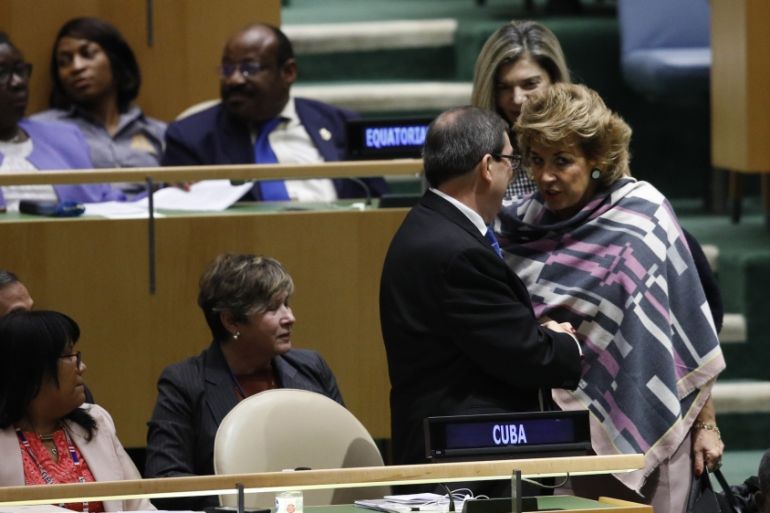UN votes overwhelmingly to condemn US embargo on Cuba
The UN General Assembly backed a resolution for an end to US embargo on Cuba by 189-2 in a slap to Washington.

The United Nations General Assembly has overwhelmingly backed a resolution condemning the US economic embargo on Cuba after rejecting proposed US amendments criticising the communist nation on its human rights record.
Out of the 193-member body, 189 countries voted in favour of the resolution at the 27th annual General Assembly meeting, with only the US and Israel voting against. Moldova and Ukraine did not vote.
Keep reading
list of 4 itemsAfrican countries call for sanctions as UN nears treaty on ‘biopiracy’
Can UNGA support get Palestine full UN membership?
South Africa asks ICJ to order Israel to withdraw from Gaza’s Rafah
The resolutions are unenforceable, but they reflect world opinion and the vote has given Cuba an annual stage for the last 27 years to demonstrate the isolation of the US on the embargo imposed in 1960.
US Ambassador to the United Nations Nikki Haley slammed the UN, saying the body “has lost, it has rejected the opportunity to speak on behalf of human rights.”
“You’re not hurting the United States when you do this,” she told those supporting the resolution. “You’re literally hurting the Cuban people by telling the regime that their treatment of their people is acceptable.”
US has ‘no moral authority to criticise Cuba’
In earlier separate votes on the proposed US amendments, Ukraine and Israel were the only countries to join the US in voting “yes” on all eight measures while 114 countries voted against and 65 abstained.
The proposed amendments expressed serious concern at the lack of freedom of expression and access to information in Cuba and the prohibition on workers’ right to strike.
US sanctions were imposed in 1960 following the revolution led by Fidel Castro and the nationalisation of properties belonging to US citizens and corporations.
Cuba’s Foreign Minister Bruno Rodriguez called the US embargo “a flagrant, massive and systematic violation of the human rights of Cuban men and women” and denounced what he called the politicised US amendments.
“The embargo is a violation of the purposes and principles of the Charter of the United Nations and of international law,” he said before the vote.
“The government of the United States doesn’t have the least moral authority to criticise Cuba or anyone when it comes to human rights,” he added.
The decision by the administration of US President Donald Trump to call for a vote on each of the eight amendments represents an escalation of its action last year and reflects worsening US-Cuban relations.
Former Cuban President Raul Castro and then President Barack Obama officially restored relations in July 2016 after 54 years.
But Ambassador Haley and others have sharply criticised Cuba’s human rights record. In 2017, the US returned to voting against the resolution condemning the American economic embargo after the Obama administration abstained in 2016, a first for the US in 25 years.
‘Troika of tyranny’
Thursday’s vote came shortly before Trump’s national security adviser John Bolton announced in Florida that the administration is imposing new sanctions on Cuba and Venezuela and soon on Nicaragua, calling the three countries a “troika of tyranny”.
Speaking at the Freedom Tower in Miami, a building where Cubans fleeing the revolution led by Castro received US government documents in the 1960s and early 1970s, Bolton condemned what he called the “destructive forces of oppression, socialism and totalitarianism” that he said the three countries represent.
Bolton blamed Cuba for enabling Nicolas Maduro‘s government and he urged the nations of the region to “let the Cuban regime know that it will be held responsible for continued oppression in Venezuela”.
“The United States now looks forward to watching each corner of the triangle fall in Havana, in Caracas, in Managua,” he said.
“The troika will crumble, the people will triumph and the righteous flame of freedom will burn brightly again in this hemisphere.”
According to Bolton, the Department of State has added more than two dozen entities owned or controlled by the Cuban military and intelligence services to a restricted list of entities with which financial transactions by US persons are prohibited.
Bolton said the goal is to prevent money from reaching the Cuban military, security and intelligence services.